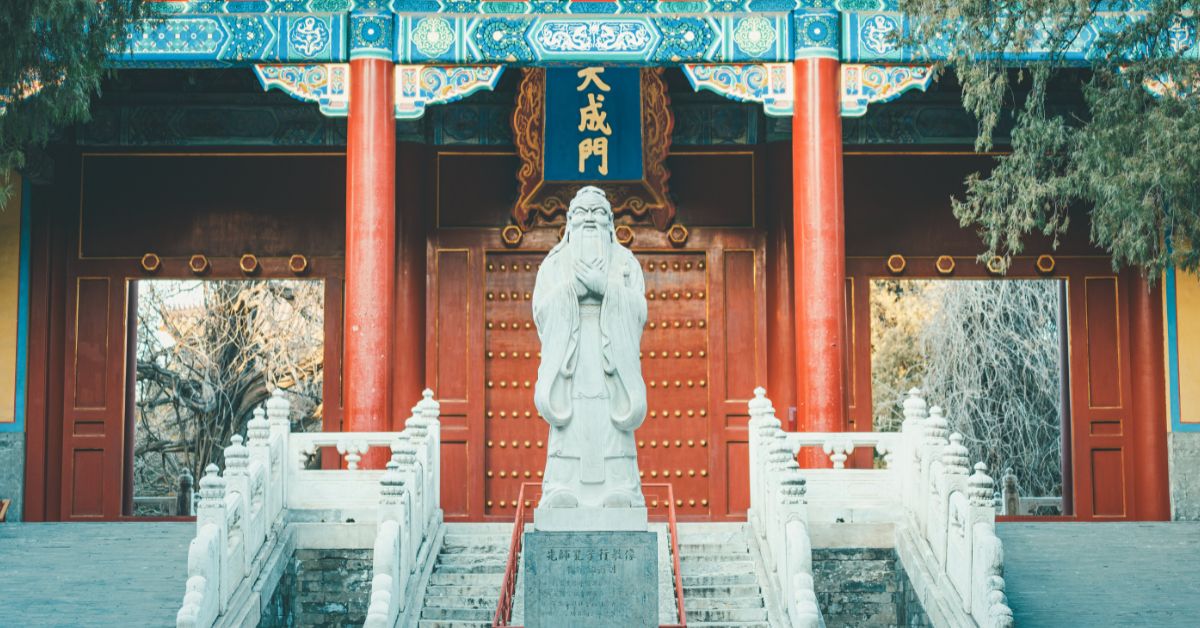Outline:
- The Quiet Teacher of Timeless Values
- Harmony Over Chaos: The Foundation of Confucian Thought
- The Importance of Ritual and Respect
- Cultivating Character: The Gentle Power of Virtue
- Confucian Wisdom for the Modern World
- Becoming Human, Together
- FAQs
The Quiet Teacher of Timeless Values
More than 2,500 years ago, in a time of political unrest and moral decline, a teacher walked across the fields of ancient China—not with an army, but with ideas. His name was Confucius, and his influence would ripple across dynasties, cultures, and centuries.
He didn’t speak in abstractions or metaphysics. His wisdom was grounded, ethical, relational. It asked not, What is the nature of the universe? but What kind of person should I be?
And though the world has changed in form, his questions still echo. In families, workplaces, schools, and governments—the core of what it means to live well with others remains.
Confucius didn’t offer shortcuts. He offered principles—quiet, steady, and strong. And in our fast-paced world, they may be more needed than ever.
Harmony Over Chaos: The Foundation of Confucian Thought
If there’s one word that runs like a thread through all of Confucius’ teachings, it’s harmony (he). Harmony is not sameness. It’s not uniformity. It is balance among difference, the gentle alignment of relationships, roles, and actions.
Confucius believed that society functions best when people know their place—not in a rigid, oppressive sense, but as participants in a larger whole. Like instruments in an orchestra, each person has a part to play—and when played with care, the result is harmony.
In a time when individualism often overshadows connection, this idea is quietly radical: we are not isolated selves, but interwoven beings. And peace, both inner and outer, comes not from asserting control—but from understanding relationship.
The Importance of Ritual and Respect
In Confucian thought, ritual (li) isn’t just ceremony. It’s the art of moving through life with reverence and attention. It lives in how we greet one another, how we share meals, how we mourn, how we show up fully in the ordinary.
Ritual teaches presence. It reminds us that life is sacred—not because of grand events, but because of daily interactions done with care. Bowing, listening, offering a seat—these acts, repeated over time, shape character and community.
And central to ritual is respect—especially for elders, parents, teachers, and tradition. Confucius believed that how we treat others—especially those with less to offer us—reveals who we truly are.
In a world of casualness and speed, ritual slows us down. It creates space for dignity. It tells us: this moment matters.
Cultivating Character: The Gentle Power of Virtue
Confucius didn’t preach dogma. He taught virtue—what he called ren, often translated as “benevolence” or “human-heartedness.”
Ren is not something you’re born with. It’s something you grow—through self-reflection, discipline, and daily practice. It’s how you carry yourself. How you speak. How you respond when you have power—or none.
He wrote:
“The superior person first practices what they preach, and then preaches according to their practice.”
Modern psychology supports this. Studies in character development show that small, consistent behaviors shape our sense of integrity. Confucius knew this centuries ago: wisdom is not a talent. It is a craft. And the raw material is your daily life.
Confucian Wisdom for the Modern World
So how do we live Confucius’ teachings today—not in temples, but in city streets, meetings, families, and friendships?
- Listen more than you speak. Confucius placed great value on silence, reflection, and thoughtful response. In a world that rewards quick takes, this is a discipline of depth.
- Respect your roles, but don’t be rigid. Whether as a parent, a partner, a leader, or a student—know your responsibility and carry it with grace. Identity becomes meaningful through service.
- Practice presence in small things. A shared meal. A thank-you note. A held door. These are not trivial—they are how character is built.
- Commit to becoming better. Confucius saw life as a process of refinement:
“When we see men of virtue, we should think of equaling them; when we see men of a contrary character, we should turn inward and examine ourselves.”
Confucian wisdom isn’t flashy. It’s quiet, slow, and steady. But in its humility, it holds power.
Becoming Human, Together
Confucius didn’t promise enlightenment. He promised effort. Reflection. Humility. And over time, transformation.
In his view, becoming truly human was not a personal pursuit—but a collective one. Who we are is shaped by how we live with others. What we become is guided by what we honor.
And that kind of wisdom—relational, ethical, rooted—doesn’t fade with time. It only grows more relevant in a fragmented world hungry for connection.
To follow Confucius is not to memorize ancient texts. It is to move through life with care, to honor your role in the human fabric, and to walk a path of quiet, enduring integrity.
FAQs
Is Confucianism a religion or a philosophy?
Confucianism is more of a philosophical and ethical system than a religion. It doesn’t focus on worship or the divine, but on how to live wisely and harmoniously within society.
Can Confucian values apply in modern individualistic cultures?
Yes. While Confucianism emphasizes community and duty, its core values—respect, self-cultivation, compassion—are universally human and can enrich even the most individualistic environments.
How can I start practicing Confucian principles today?Begin with awareness. Show respect in everyday interactions. Reflect on your roles and how you fulfill them. Focus less on achieving and more on becoming. That’s the heart of Confucian wisdom.








